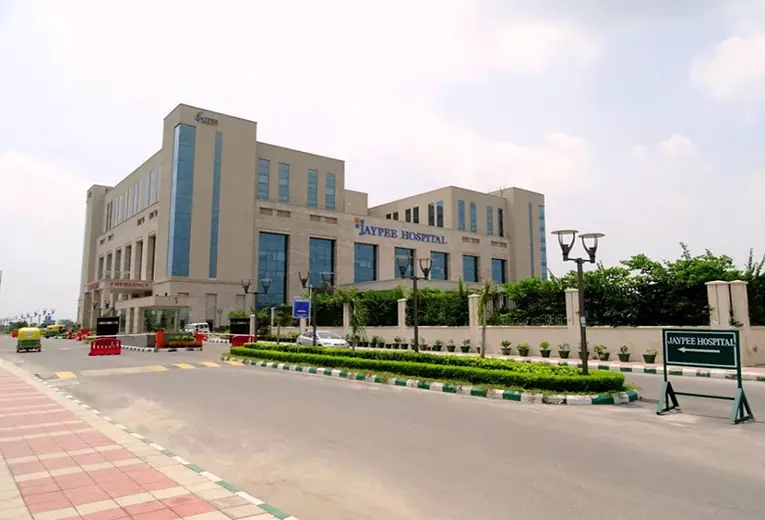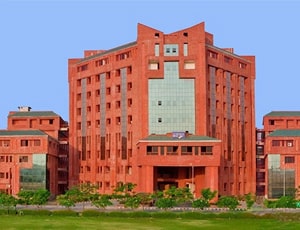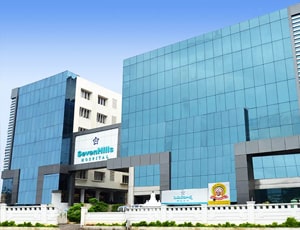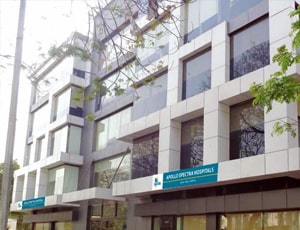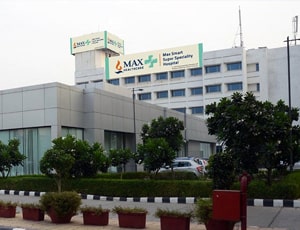Overview
Tuberculosis (TB) is a potentially fatal infectious disease affecting mostly the lungs. Tuberculosis bacteria are communicated from person to person via minute droplets discharged into the air by coughs and sneezes. According to a WHO report published in 2020, tuberculosis is the world’s 13th biggest cause of death and the second leading infectious killer (after HIV/AIDS). Globally, an estimated 10 million people will contract tuberculosis (TB) by 2020. There are 5.6 million males, 3.3 million women, and 1.1 million children in the United States. Tuberculosis is seen in all countries and in all age groups.
Every year on March 24th, International Tuberculosis Day is held to raise public awareness that tuberculosis remains an epidemic in much of the world, killing approximately 1.5 million people each year, largely in developing nations. Each year, the day is followed by a specific theme and this year (2022) the theme for the day is: ‘Invest to End TB. Save Lives’.
History of World TB Day
Dr. Robert Koch reported the discovery of Mycobacterium tuberculosis, the germ that causes tuberculosis, on March 24, 1882. (TB). TB killed one out of every seven persons in the United States and Europe at this time. The finding made by Dr. Koch was the most significant step toward the control and eradication of this fatal disease. A century later, March 24 was declared as World Tuberculosis Day, a day dedicated to educating the public about the global effects of tuberculosis.
Though Mycobacterium tuberculosis may have been existing for as long as 3 million years, Johann Schonlein developed the word “tuberculosis” in 1834. Robert further emphasized that World TB Day will not be a celebration until tuberculosis is eradicated. However, it is an important opportunity to inform the public about the destruction caused by tuberculosis and how it can be prevented.
Symptoms & Causes of Tuberculosis
Signs and symptoms of active TB include:
- Coughing for three or more weeks
- Coughing up blood or mucus
- Chest pain, or pain with breathing or coughing
- Unintentional weight loss
- Fatigue
- Fever
- Night sweats
- Chills
- Loss of appetite
- Tuberculosis can also damage other organs in the body, such as the kidneys, spine, and brain. When tuberculosis affects organs other than your lungs, the signs and symptoms differ. Tuberculosis in the spine, for example, can cause back discomfort, while tuberculosis of the kidneys can produce blood in the urine.
Causes: Tuberculosis is caused by bacteria that spread from person to person by airborne tiny droplets. When someone with untreated active tuberculosis coughs, speaks, sneezes, spits, laughs or sings, this can happen. Despite the fact that tuberculosis is contagious, it is difficult to contract. Tuberculosis is significantly more likely to spread among people you live or work with than it is to spread among strangers. Most persons with active tuberculosis who have been on effective medication for at least two weeks are no longer contagious. Causes are categorized majorly in two categories- HIV & TB and Drug-resistant TB. Anyone can get tuberculosis, but certain factors can increase your risk, including a weakened immune system, traveling or living in certain areas, IV drugs or excessive alcohol use, using tobacco, working in healthcare, living with someone infected with TB.
Impact of TB in The World
Tuberculosis (TB) is caused by bacteria (Mycobacterium tuberculosis) that most often affect the lungs. Tuberculosis is curable and preventable. TB is spread from person to person through the air. When people with lung TB cough, sneeze or spit, they propel the TB germs into the air. A person needs to inhale only a few of these germs to become infected. About one-quarter of the world’s population has a TB infection, which means people have been infected by TB bacteria but are not (yet) ill with the disease and cannot transmit it. People infected with TB bacteria have a 5–10% lifetime risk of falling ill with TB. Those with compromised immune systems, such as people living with HIV, malnutrition, or diabetes, or people who use tobacco, have a higher risk of falling ill.
WHO reported the global burden of TB, which occurs in every part of the world. In 2020, the largest number of new TB cases occurred in the WHO South-East Asian Region, with 43% of new cases, followed by the WHO African Region, with 25% of new cases, and the WHO Western Pacific with 18%. In 2020, 86% of new TB cases occurred in the 30 high TB burden countries. Eight countries accounted for two-thirds of the new TB cases: India, China, Indonesia, the Philippines, Pakistan, Nigeria, Bangladesh, and South Africa. People suffering from tuberculosis no longer have to be concerned or panicked when their doctor informs them that they have been diagnosed with the disease (Tb). Tuberculosis is now treatable and thus curable, thanks to recent medical advances. TB is a treatable and curable disease.
Why do we commemorate World TB Day?
On 24th March, every year we commemorate World TB Day to raise public awareness about the devastating health, social and economic consequences of tuberculosis (TB) and to step up efforts to end the global TB epidemic. The date marks the day in 1882 when Dr. Robert Koch announced that he had discovered the bacterium that causes TB, which opened the way towards diagnosing and curing this disease. TB is the leading cause of death of people with HIV and a major contributor to antimicrobial resistance. World TB Day is an opportunity to focus on the people affected by this disease and to call for accelerated action to end TB suffering and deaths, especially in the midst of the ongoing COVID-19 crisis.
This year, we are focusing on a new theme with the same motive to end TB- ‘Invest to End TB. Save Lives’, which conveys the urgent need to invest resources to ramp up the fight against TB and achieve the commitments to end TB made by global leaders. This is especially critical in the context of the COVID-19 pandemic that has put End TB progress at risk, and to ensure equitable access to prevention and care in line with WHO’s drive towards achieving Universal Health Coverage. More investment will save millions more lives, accelerating the end of the TB epidemic.
Preventive Measures:
If you have latent tuberculosis, your doctor may prescribe medicine to prevent you from developing active tuberculosis. Tuberculosis (TB) is only contagious when it is active.
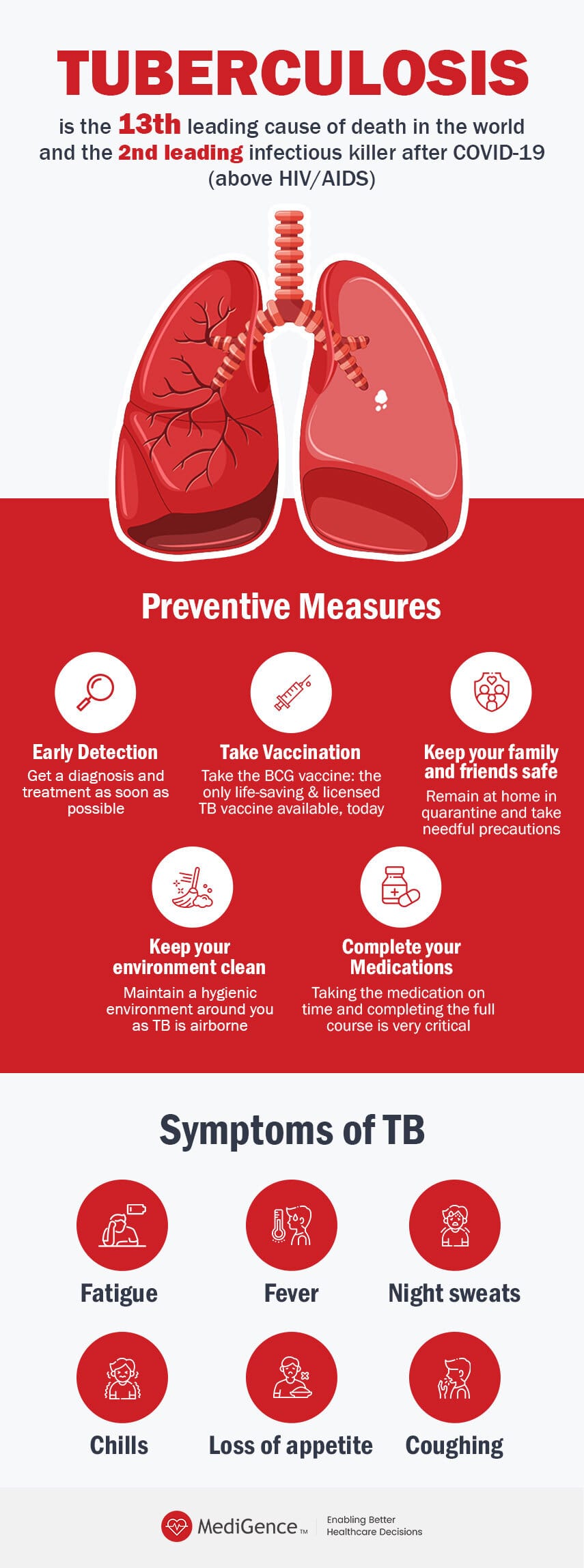
Early Detection: The most effective strategy to prevent tuberculosis is to get a diagnosis and treatment as soon as possible. The majority of patients do not remain infectious after two weeks of therapy.
Keep your family and friends safe: If you have active tuberculosis, it usually takes a few weeks of TB medication before you are no longer contagious. To keep your friends and family from getting sick, follow these guidelines:
- Remain at home. During the first several weeks of therapy, avoid going to work or school, as well as sleeping in a shared room.
- Make sure the room is well ventilated. Tuberculosis germs are more easily disseminated in tiny, enclosed settings where air does not circulate. Open the windows and use a fan to blow interior air outside if it’s not too cold outside.
- Cover your mouth with your hand. When you laugh, sneeze, or cough, cover your mouth with a tissue. Place the soiled tissue in a bag, seal it, and toss it out.
- Wear a face mask. Wearing a face mask when you’re around other people during the first three weeks of treatment may help lessen the risk of transmission.
Keep Your Environment Clean: Tuberculosis is an airborne disease, thus keeping our surroundings clean is critical.
Following these basic procedures can help lower the chance of infection:
- By maintaining good ventilation, natural sources of light (UV light destroys TB germs), and excellent hygiene (covering mouth while coughing and sneezing), the spread of TB bacteria can be reduced.
Complete your medication: This is the most critical step you can take to prevent tuberculosis in yourself and others. TB germs have a chance to evolve modifications that allow them to withstand the most strong TB medications if you quit therapy early or skip doses. The resulting drug-resistant strains are deadlier and more difficult to treat.
The BCG Vaccination: The BCG vaccine (Bacille Calmette-Guerin) is the only life-saving and licensed TB vaccine available today, and it has been in use since 1921. This vaccine is made from a strain of Mycobacterium Bovis, a weakened bovine tuberculosis bacillus. The vaccine is 80% efficient in preventing tuberculosis and is significantly more successful in children with a complex form of the disease. Before beginning any medicine, you should speak with your doctor.
Getting back on the importance of the International WORLD TB DAY, once again…
It is an opportunity to gather political and societal commitments for future success in the fight to eradicate tuberculosis as a public health problem. Nearly nine million individuals are diagnosed with tuberculosis each year, and about three million of them do not receive the treatment they require due to lack of healthcare access or lack of knowledge for misdiagnosis. It is past time for us to address this frightening situation and seek medical advice in order to ensure prompt diagnosis and treatment and to rid our communities of tuberculosis.
Some of the best Hospitals for TB Treatment in India
Jaypee Hospital
Noida,India
Shri Jai Prakash Gaur, the Founder Chairman was the one to conceptualize the model and see the final establishment of the Jaypee Hospital with the idea to promote world class healthcare which can be accessed by the masses at an affordable price with no compromise on quality. It is the flagship hospital of the Jaypee group. It is a tertiary care multi specialty hospital which has been commissioned partly in the first phase. Located at a well connected place in Noida and yet very aesthetically… Read More
119
PROCEDURES
25
DOCTORS in 14 Specialties
6+
Facilities & Amenities
Sharda Hospital
Greater Noida,India
Established in 2oo5, Sharda Hospital is a state-of-the-art multi-specialty hospital in Delhi NCR. The hospital boasts of modern amenities and world-class equipment representing global healthcare standards. The highly qualified and experienced specialists at Sharda make it a preferred healthcare destination in NCR. The Hospital has 900+ beds including 90 beds in critical care in the field of medicine, Pulmonology, Surgery, Paediatrics, Neonatology, Cardiology, Cardiothoracic surgery and Neuro… Read More
101
PROCEDURES
26
DOCTORS in 12 Specialties
6+
Facilities & Amenities
Seven Hills Hospital
Mumbai,India
As a leading healthcare service provider in India Sevenhills hospital is aiming at providing total holistic care starting from diagnostics to treatments, daycare specialty services, and other related facilities. It has more than 3 decades of valuable experience in healthcare service and has defined healthcare service as a noble profession where each and every individual get equal rights to quality health treatments. For 50 million Indians this has been a household name in a very l… Read More
88
PROCEDURES
17
DOCTORS in 11 Specialties
6+
Facilities & Amenities
Wockhardt Hospital, Umrao
Thane,India
Inaugurated only in the year 2014 Wockhardt Hospital in Mira Road has been active in providing comprehensive healthcare and has become a name well revered by people for its high quality services given in a healthy and restorative environment. High end critical care services are available in Wockhardt Umrao which includes consultancy for treatment packages and diagnostics service and therapies. It has a vast building with 14 stories dedicated to various departments making it a multi spe… Read More
101
PROCEDURES
15
DOCTORS in 13 Specialties
6+
Facilities & Amenities
Fortis Malar Hospital
Chennai,India
When thinking about a distinguished name of a multi super specialty hospital in Chennai then Fortis Malar has to come in the list. It provides comprehensive medical care as a renowned corporate hospital in critical areas of healthcare like neurology, cardio-thoracic surgery, cardiac surgery, gynaecology, orthopedics, neurosurgery, nephrology, diabetics, paediatrics, urology and many more fields. It saw its establishment in the year 1992 and soon made its way to fame for being a classic terti… Read More
61
PROCEDURES
20
DOCTORS in 9 Specialties
6+
Facilities & Amenities
Apollo Spectra Hospital
Pune,India
Situated in Saras Bagh, Apollo Spectra is the best multi-specialty hospital for minimally invasive techniques in Pune. This state-of-the-art speciality hospital is committed to bring together the world-class medical services and world’s best healthcare management practices. The hospital is the recognized centre of excellence in General and Laparoscopic surgery, Orthopedic and Spine, Bariatric surgery, varicose veins. Other specialities include ENT, Gastroenterology, General M… Read More
19
PROCEDURES
7
DOCTORS in 7 Specialties
3+
Facilities & Amenities
Max Smart is a 250 bedded multi-speciality tertiary care hospital owned and operated by the Max Healthcare Group. Offers services across multiple specialities like Cardiac, Orthopedics, Urology, Neurology, Pediatrics, Obstetrics and Gynecology.
Facilities:-
-
Comfortable rooms in all categories ranging from presidential suite, economy, d… Read More
112
PROCEDURES
24
DOCTORS in 12 Specialties
6+
Facilities & Amenities
2+
Reviews
Aster CMI Hospital
Bengaluru,India
Aster CMI Hospital is DM healthcare’s extension to create world-class hospitals. One of the biggest and fastest growing conglomerates, the hospital has a full range of healthcare services. Hospital has experienced team of experienced professionals, aimed to offer quality healthcare.
Aster CMI Hospital has spread through 320 establishments in 9 countries and still expanding. It has transitioned into being a developing network across the India and Middle East. An expensive portfo… Read More
95
PROCEDURES
22
DOCTORS in 13 Specialties
6+
Facilities & Amenities
Reference Links:
The post World Tuberculosis (TB) Day 2022 | MediGence appeared first on MediGence.
